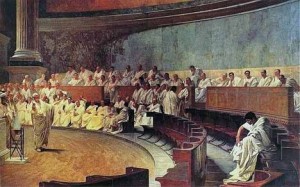What was the point of the Byzantine Senate?
 It’s the morning after an election and as luck would have it Shane asks a political question- what did the Senate do other than enrich itself and plot?
It’s the morning after an election and as luck would have it Shane asks a political question- what did the Senate do other than enrich itself and plot?
Aristotle first observed that ‘man is a political animal’ and as far as senators go that animal hasn’t changed in more than 2,000 years.
From the beginning Byzantine senators were lured east by the perks- free grain and land at the state’s expense. There were relatively few duties to get in the way of enjoying the good life. While the Roman Empire held on to the conceit that it was a Republic long after any trace of representative government had vanished- as late as the 6th century it was still issuing coins proclaiming the Republic- actual responsibilities were few and far between. There was an obscure clause in one of Justinian’s law codes that said any new law had to be discussed by the Senate, but it was never enforced. Their sole administrative duty was to manage the spending of money on the exhibition of games or public works. This was not a highly lucrative job, so most senators (there were 2,000 of them) used the office for tax reasons- namely to escape the fees levied on others. (the more things change…)
Of course the Senate never quite forgot its august history and there were sporadic attempts to grasp real power. In 532 they participated in the Nika Riots hoping to replace Justinian with one of their own members. (Justinian repaid them by confiscating the Senate House and turning it into a reception hall for the Great Palace.) In 608 they elected Heraclius as Consul, then elevated him to emperor against the usurper Phocas. On his deathbed in 641, Heraclius thanked them by entrusting his young son Heraklonas to their care. The Senate promptly deposed the boy and replaced him with a grandson of Heraclius named Constans II. For the next three years the empire was openly ruled by the Senate- the first time since the assassination of Julius Caesar in 44 BC.
That turned out to be the swan song of senatorial ambition. After Constans came of age their importance quickly declined. The Macedonian emperors stripped them of most of their remaining duties and the Senate was turned into a glorified imperial court. Ordinary criminals were given a jury of 5 senators chosen by lot, while high treason involved the whole body. There was still a whiff of prestige attached to the name, but Alexius Comnenus did away with that by allowing anyone to purchase senatorial rank directly from the emperor.
Their last known act was to elect a man named Nicholaus Kanabus as emperor in opposition to the pathetic Isaac II during the fourth Crusade. Nicholaus- a gentle man- immediately fled to the Hagia Sophia and refused to come out. But his resistance to the imperial summons failed to save him. Another man seized control of the government, and as a warning to any challengers had Nicholaus dragged out of the church and strangled.